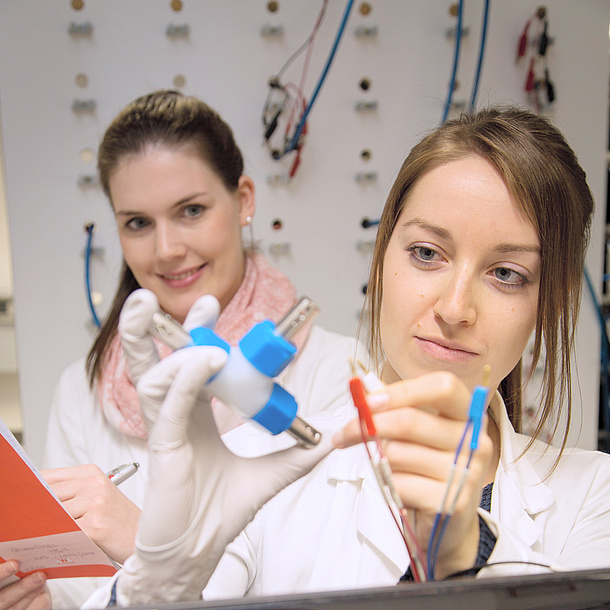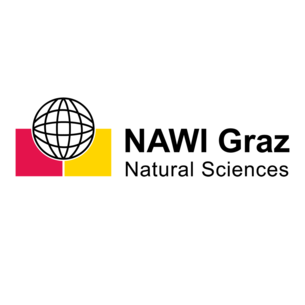- Duration of study: 4 semesters
- ECTS credit points: 120
- Academic degree: Master of Science (MSc)
- Language of instruction: English
The Master's Programme
The Master's degree programme in Chemistry is offered jointly by TU Graz and the University of Graz, taking place in an internationally recognized science and teaching environment. This gives you the opportunity to take part in research projects as part of early on in the programme. You
- will deepen your basic knowledge in chemistry. You can choose individual focal areas from a wide range of electives and learn how to apply methods used in analytical, inorganic, organic, physical and theoretical chemistry.
- can work independently on scientific problems and understand and interpret the results.
- conduct research and work both independently and in teams, e.g. for laboratory exercises, projects and scientific papers.
- create instructions for experiments and experimental setups, carrying out experiments independently.
- learn how to assess risks associated with handling substances, products and carrying out processes, but also become aware of ethical, social, economic, environmental and safety implications of work in the field of chemistry.
You can choose to conduct the laboratory exercises and your master's thesis work at an institute and research group that fits your individual interests, selecting from a broad repertoire. This repertoire includes everything from materials science to drug synthesis, battery research, basic and applied research in several disciplines, and chemical technology.
As part of your studies, you will choose your specialisation in three of the following interdisciplinary modules depending on your interests and complete laboratory exercises:
Synthesis: You learn the basics of organometallic chemistry and obtain competence in advanced organic chemistry (stereochemistry, retrosynthesis, electroorganic chemistry). Furthermore, you will learn about (in)organic reaction mechanisms, advanced polymer synthesis, flow chemistry, photochemistry, and energy conversion.
Applied Analytics: You will use analytical methods to identify (in)organic compounds used in the fields of environmental, food, and pharmaceutical chemistry. You learn how to apply strategies to evaluate large amounts of data and to solve analytical problems. You will learn more about NMR spectroscopy and single crystal structure analysis methods.
Catalysis: You will learn the basics of biocatalysis, photocatalysis, and heterogeneous catalysis as well as macromolecular, bioinorganic, and electroanalytical chemistry. You will also gain insights into advanced catalytic chemistry topics, including asymmetric catalysis and catalysis with renewable raw materials.
Chemistry in Life Science and Environment: You will explore applications of chemistry in the life sciences and the environment and investigate the contribution of chemistry to sustainability. For example, you will learn more about food chemistry and technology, biomedical chemistry, the chemistry of bio-based systems, chemical biology, and physiology and toxicology.
Structure and Properties of Condensed Matter: You will learn about the structures and properties of solids and liquids as well as the modern experimental methods used to characterise them. You will also expand your knowledge of modern materials, transport phenomena, and electrical applications of solids, among other things.
Modelling and Theory: You will become familiar with simulation methods used to describe chemical compounds and materials and learn how to apply different computational methods. You will work with standard programmes used for simulation and visualisation and apply programming techniques and tools to evaluate data.
Studying chemistry at TU Graz offers a wide variety of possibilities. You can either become a scientist, work as a developer for most science and/or technology based companies, be the head of its research or analytical laboratory. More importantly with chemistry, you deeply understand the connection of matter and its properties which can be seen in everyday life.
Marcell supported international prospective students as International Student Ambassador.
Students benefit from the numerous available cooperations with a wide variety of companies in industry, such as Anton Paar, Borealis, Baumit, Andritz Hydro, Mondi, AT&S AVL, ams AG, Continental, BMW, AGRANA GmbH, and HILFI.
By taking part in cooperation projects and writing master's theses with industrial partners, you will learn more about practical applications of knowledge and have the opportunity to already establish contacts with potential employers.
Admission
Admission without admission procedure
Graduates of the Bachelor’s Programme in Chemistry offered at TU Graz and University of Graz as well as students, who have already been admitted to the following Master's programmes offered at TU Graz or University of Graz, are eligible for admission without an admission procedure:
- Chemistry
- Technical Chemistry
Graduates of other programmes offered at TU Graz or NAWI Graz students at the University of Graz can apply for admission at the Registrar's Office.
Admission with admission procedure
Graduates of a previous study programme not mentioned above undergo an admission procedure.
Registration for the academic year 2027/28: 15 October to 15 December 2026
You can complete the admission procedure before the end of your bachelor’s studies.
- Admission and deadlines for Austrian students who are beginning their studies at TU Graz for the first time
- Admission and deadlines for international students
- If you are or were already admitted to a degree programme at TU Graz, please come to the TU Graz Registrar’s Office in person during the admission period or contact study@tugraz.at.
Contact study@tugraz.at
Career Prospects
The Master's degree programme in Chemistry provides a research-based education that enables you to enter a career in all areas of chemistry or technical chemistry, such as analytical and synthetic chemistry, materials science, biomaterial and natural products chemistry, chemical engineering, environmental and food chemistry.
Typical employers include:
- chemical and pharmaceutical companies,
- the food or raw materials industries,
- the pulp and paper industry,
- biotechnology providers and
- the petroleum industry.
Other occupational fields are opening up in the areas of environmental technology and bioanalysis, as well as in public administration areas, such as in patenting.
As a chemist...
- you will conduct research and develop innovative systems in the field of chemistry, e.g. sensors, syntheses, polymers, battery materials, bio- and organocatalysis.
- develop substances that can be used to produce everyday objects, food and medicines.
- work on new developments in the field of environmental technology, e.g. in recycling, plastics technology, or pollution control.
- manage research projects in research, industry and business sectors.
Acquire AI skills: AIE Extension Programme
Increase your career prospects with the Artificial Intelligence Engineering (AIE) extension programme and learn essential skills in AI development and application during or after completing your Master's degree.





